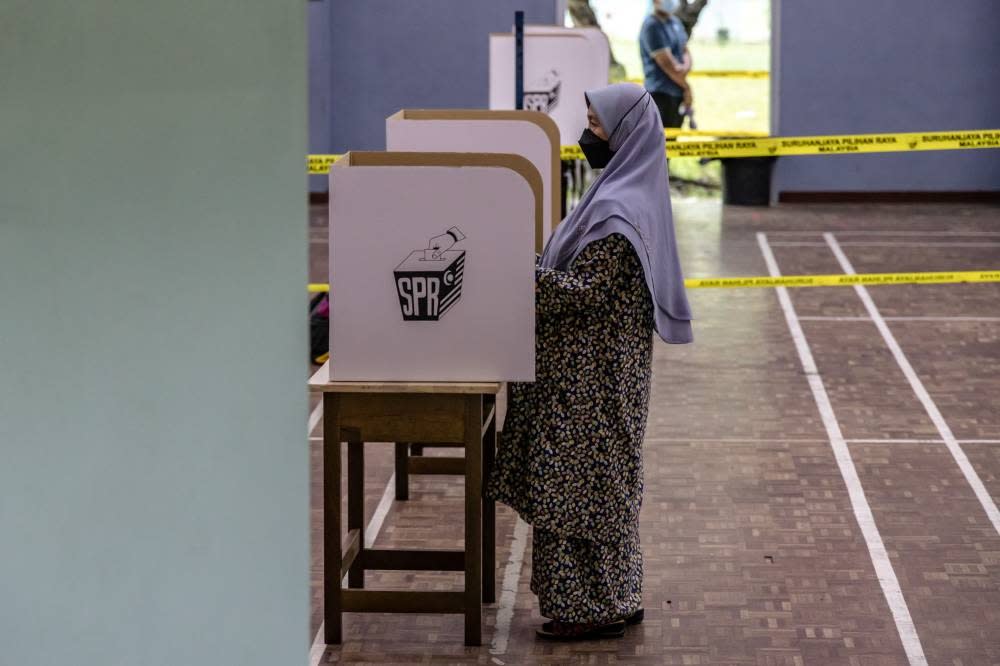Singapore paper says youth votes behind swing to Perikatan in GE15

KUALA LUMPUR, Dec 17 ― The unexpectedly strong showing by Perikatan Nasional (PN) in the recent 15th general election (GE15) has been largely attributed to a younger voter base, according to estimated analysis by Singapore-based media The Straits Times (ST).
Based on the age profile of registered voters in each constituency, ST found that in the seats won by PN, registered voters were “younger”, with a higher proportion of registered voters aged 18 to 39 years compared with the national average.
Seats won by Barisan Nasional (BN) have a higher proportion of registered voters in their 30s, while Pakatan Harapan (PH) seats are the “oldest”, with a higher share of registered voters in their 40s, 50s, 70s and above.
However, the report by ST cautioned that these findings should be seen as estimates as the analysis was based on all registered voters in the constituencies, including those who did not show up to vote.
“A more robust analysis can be performed only if one has access to the election score sheets in each polling district, and only if one knows the age range of voters assigned to each saluran, or voting stream,” it said.
Among all the seats that PN won, Putrajaya had the highest percentage of registered voters aged 30 to 39 years and a higher proportion of voters aged 18 to 20 years.
There, BN’s Datuk Seri Tengku Adnan Tengku Mansor lost the seat he held for 18 years to PN’s Bersatu vice president Datuk Radzi Jidin by 6.3 percentage points.
Analysts have suggested various reasons why many young voters gravitated towards PN.
ISEAS-Yusof Ishak Institute visiting research fellow Faizal Musa said many voters were too young to recall Datuk Seri Anwar Ibrahim’s “Reformasi” struggle while Merdeka Center’s Ibrahim Suffian said many first-time young voters were more inclined towards Bersatu president Tan Sri Muhyiddin Yassin because of his visibility as the prime minister who managed the Covid-19 crisis.
ISEAS-Yusof Ishak Institute Kevin Zhang said young voters’ support for PN could also have been a protest vote against corruption, which they saw as the main reason for the country’s lacklustre economy and ever rising cost of living.
But almost all agree that PN’s utilisation of popular video sharing media TikTok for their campaigns, featuring many popular influencers and ustaz (religious teachers) from PAS was one of the main draws for youths.
University of Nottingham Malaysia assistant professor Dr Gayathry Venkiteswaran said PN took advantage of TikTok’s growing popularity with young people and came up with the “most visible, well-designed content” of the three main coalitions.
“PN’s campaign was 'sophisticated', with its two main component parties using a differentiated approach to target different groups,” she was quoted saying.
“Bersatu had largely relied on a network of popular influencers, with messages that were very insidious. You have those (influencers) with logos of the party on their T-shirts, naming the candidates. But a lot of content also comes from people who are very popular on TikTok who start off by talking about something else, and then it gets to the support for the political party or the manifesto,” she said.
PAS on the other hand, had many bite-sized TikTok clips on Islamic teachings featuring their popular religious teachers.
Analysts also noted the circulation of many videos that attacked PH as being anti-Muslim, pro-Chinese and LGBTQ-friendly before TikTok removed those flagged for carrying false claims and incendiary messages. LGBTQ stands for lesbian, gay, bisexual, transgender and queer.
A PN campaign official told ST that its success on TikTok was through “trial and error”.
“We knew that Muhyiddin was rely well liked for his ‘abah’ persona, so we featured him prominently. If you started a new account and just tagged it with abah, you would go viral,” she said.
“This may answer why so many influencers were supporting us because they knew that producing content about PN and abah would gain more eyeballs,” she said, adding that PN did not pay for influencers as many parties claimed.
In the polls on November 19, PN won 74 out of 222 parliamentary seats in the election, just behind PH’s 82 seats and way ahead of BN’s 30 seats. They will serve as the Opposition bloc in Parliament, after it declined to form a unity government with Anwar.



